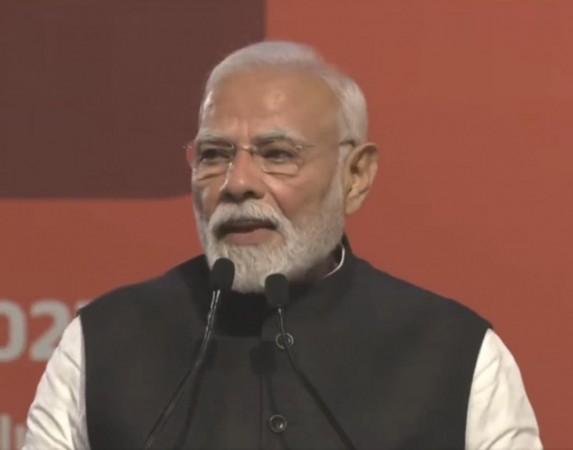
Prime Minister Narendra Modi recently visited Bengaluru, where he praised the youth of Karnataka for their significant contributions to India's defense capabilities. Speaking at the IIIT Auditorium in Electronics City, Modi highlighted the role of Bengaluru's tech-savvy youth in providing cutting-edge technology to the Indian Armed Forces. This technological support was crucial in the success of Operation Sindoor, a military operation that effectively countered terrorist threats from Pakistan. Modi's visit marked his first to the city since the operation, emphasizing the importance of Bengaluru's contributions to national security.
Operation Sindoor involved strategic military maneuvers deep into Pakistani territory to dismantle terrorist camps. "The Indian Armed Forces successfully carried out Operation Sindoor by entering deep into Pakistan's territory and destroying terrorist camps," Modi stated. He emphasized that the operation forced Pakistan, a nation long accused of supporting terrorism, to capitulate to India's demands. "Operation Sindoor compelled Pakistan, which has long supported terrorism, to kneel before India. The world witnessed the capability of a New India," he added.
Modi posed a rhetorical question to the audience, asking, "Can you guess who was behind the success of Operation Sindoor?" He answered, "It's our technology. This technological prowess was showcased to the world, and in this, the youth of Bengaluru and Karnataka have played a major role. For this, I congratulate you all." This acknowledgment highlights the critical role of technology and innovation in modern warfare, with Bengaluru's tech-savvy youth at the forefront.
Bengaluru's Global Standing and Infrastructure
Bengaluru, often referred to as the Silicon Valley of India, has long been a hub for technological innovation and development. Prime Minister Modi highlighted the city's global standing, stating, "Bengaluru is counted among the great global cities. We must compete globally and lead on the world stage. For this, our cities must be efficient and ensure speed." The city's infrastructure, including its metro system, plays a crucial role in maintaining this efficiency. The newly inaugurated Yellow Line Metro Service, which connects key locations in Bengaluru, is expected to significantly ease the daily commute for lakhs of residents. "When the Orange Line (Metro Phase 3) becomes operational, along with the Yellow Line, 25 lakh commuters will travel every day. This will take Bengaluru's transport system to new heights," Modi noted.
The Prime Minister also recognized the contributions of major corporations like Infosys Foundation and Biocon in the development of metro stations, praising their Corporate Social Responsibility (CSR) models as inspirational. "Their CSR model is an inspiration, and I thank the corporate sector for their support," he said.
Reflecting on his personal connection to Karnataka, Modi expressed a deep sense of belonging. "Whenever I step into Karnataka, I feel as though I have come to my own home. The culture, the love of the people, and the sweetness of the Kannada language touch my heart. Bengaluru is a symbol of the rise of New India. This city has placed India on the global map in the IT sector. The hard work and talent of its people are the driving force behind Bengaluru's success story," he remarked.
Advancements in Infrastructure and Economic Growth
In addition to his remarks on Operation Sindoor, Prime Minister Modi's visit to Bengaluru included the inauguration of the much-anticipated Yellow Line of Bengaluru's Namma Metro. This line connects R.V. Road Metro Station to Bommasandra, a crucial link for the city's IT hub. The Prime Minister flagged off the train at Ragigudda Metro Station, where he also interacted with schoolchildren and experienced the QR code-enabled ticket vending machines. A Bengaluru Metro Rail Corporation Limited (BMRCL) official noted that the train carrying the Prime Minister was operated by a woman loco pilot, highlighting the empowerment of women in the workforce.
The Yellow Line, which had faced multiple delays, is expected to alleviate congestion at the notorious Silk Board junction, benefiting thousands of employees working in Electronic City. Alongside the metro inauguration, Modi also flagged off three Vande Bharat Express trains, further enhancing the region's connectivity.
During his visit, Prime Minister Modi reiterated his commitment to the 'Atmanirbhar Bharat' mission, emphasizing the importance of self-reliance and the "Zero Defect, Zero Effect" philosophy. He highlighted India's rapid economic progress, noting that the country is on track to become the third-largest global economy. "We are rapidly moving towards becoming the top third economy. This speed came to us from the spirit of reform, perform, and transform. This speed came to us from clear intention and honest efforts," he said.
Modi's vision for India includes a robust infrastructure network, with significant advancements in metro connectivity, rail electrification, and airport expansion since 2014. "In 2014, Metro was limited to only five cities. And now there is a network of more than 1000 km in 24 cities... Before 2014, about 20,000 km of rail route was electrified... We have electrified more than 40,000 km of rail route in the last 11 years itself... Till 2014, there were only 74 airports in India. Now their number has increased to more than 160," he detailed.

















